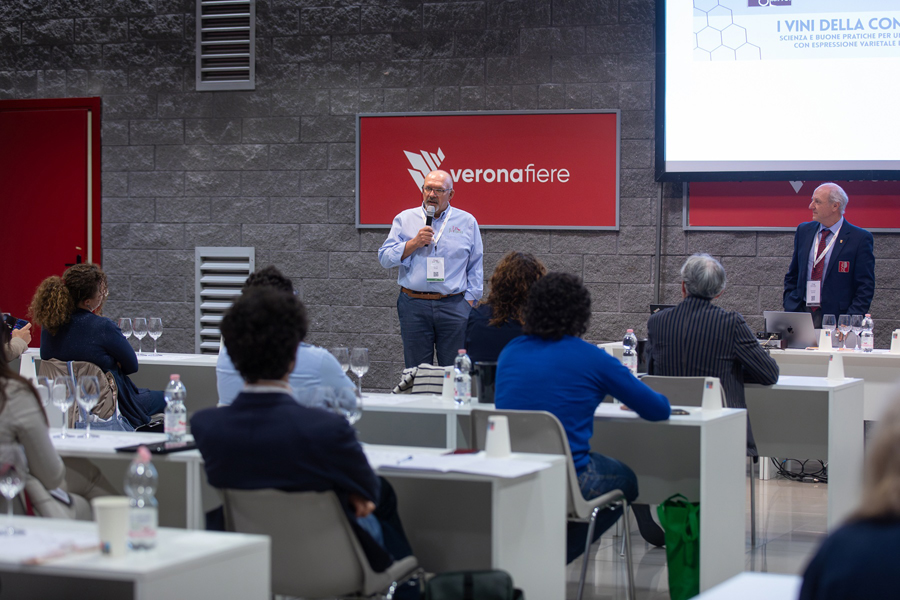Enoforum, the largest technical-scientific congress in Europe, launches a complex and important theme for the sector.
Nature is beautiful but, without knowledge, you cannot produce a great wine. This is what emerged from the seminar “Wines of knowledge”, organized as part of Enoforum.
Knowledge that starts from scientific research, which in recent years has allowed wines to be made increasingly safe, good and even environmentally friendly. Yet, too often, the narrative towards the consumer demonizes this essential role, convincing them that quality comes from doing as little as possible in the vineyard and in the cellar. Thanks to the interventions of university professors, producers and journalists, moderated by Francesco Iacono, Director of ONAV, the meeting “Wines of knowledge” opened the discussion on how to communicate clearly and effectively the great work of thousands of scientists, researchers, technicians who, daily, study how to make a wine with an identity and at the same time safe and healthy. One limit arises from the University itself, as highlighted by Professor Luca Rolle of the University of Turin, where researchers often aspire to have their studies published in specialized journals, dedicating themselves to pure research rather than applied research. Another obstacle is linked to communication in the media that influence the perception of the consumer, convinced that the best and most sustainable wine is the one where the producer does nothing or almost nothing. The consumer is disoriented by overly complex communications, just think that, just talking about sustainability, there are 64 different brands that, depending on the label, give different perceptions. This very word, sustainability, rhymes with research, where this can contribute in a decisive way, as underlined by Mario Pojer, a Trentino producer who has been producing Piwi for many years, vines that first of all allow the use of much fewer plant protection products in the vineyard, but are also equipped with other interesting characteristics. Solaris, for example, the vine used for Zero Infinito, the wine being tasted, naturally has 2 grams more tartaric acid than the varieties of Vitis Vinifera. A great advantage in a scenario in which, due to high temperatures, the collapse of acidity represents one of the major problems for wine producers. Salvatore Rizzuto of the Al_Cantara company in Randazzo, Sicily, and Luca Balbiano of the Balbiano company in Ardezeno, Piedmont, also spoke about the importance of using the fruits of research to produce better wines.
<< Research is not a machine that moves in one direction only, on the contrary, it adapts elastically to new needs .>> Says Gianni Trioli, president of Vinidea, the company that organizes Enoforum. Just think that 20 years ago, yeasts with high alcohol yields were selected while today inefficient yeasts are sought, or that clonal selection was aimed at having clones with high sugar development while today resistance to water stress is sought, just to mention two examples. A continuous evolution that leads supplier companies to respond to new needs with cutting-edge solutions in three directions. The first is the reduction of inputs in the vineyard, the reduction of inputs in the cellar, corporate sustainability through the recovery of by-products.
An evolution that requires an adaptation by everyone, including the popularizers, as underlined by the director ONAV (National Organization of Wine Tasters) Francesco Iacono, who highlighted how the Organization has modified the tasting sheet by eliminating the clarity parameter, which today no longer represents an indicator of quality.
An evolution that also raises questions for journalists, represented by Alessandro Torcoli, director of Civiltà del Bere, a historic industry magazine, who underlined how the word technology derives from the Greek Teknè, or art, know-how, and is therefore an important and precious word. In dissemination, it is essential to distinguish information from communication. Information has the duty to transmit knowledge by giving readers tools to understand while communication has the role of building a bridge, a bond, with its audience. The latter is important above all for the consumer who is interested in the hedonistic aspect of wine but not necessarily in knowing in depth what is behind the bottle. For him, social media are the main tool for contacting the company. The information, on the other hand, provided by the specialized press responds to the needs of enthusiasts, who want to know what is behind the glass and who are also interested in the scientific and technical aspects. The challenge for the future will be to reduce this dichotomy to ensure that science and technology understood as progress become a value for every attentive consumer.


